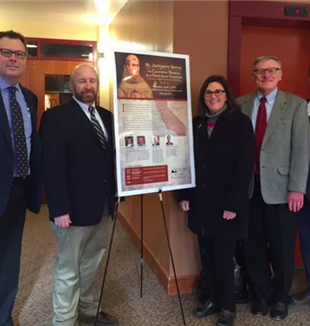
Serra Scholars Meet up in Steubenville
The California Missions & the Franciscan Tradition was the title of a well-attended one-day conference held at the Franciscan University of Steubenville on April 2.St. Junípero Serra: The California Missions & the Franciscan Tradition was the title of a well-attended one-day conference held at the Franciscan University of Steubenville on April 2. James Matenaer (History, Franciscan University), one of the conference co-organizers, began the day with a talk entitled "A Franciscan Missionary Tradition in Theory and Practice," which explored the Franciscan roots of Serra's approach to mission. Especially interesting was the discussion of the Spanish Franciscans' strong desire to live out in the New World a method of evangelization based on the humility of pure encounter and the sharing of life with unbelievers, as advocated in the sixteenth chapter of St. Francis' Earlier Rule of 1221, while at the same time developing and employing knowledge of indigenous languages and cultures, learning which Francis in the same Earlier Rule explicitly forbade.
Following Matenaer's paper was a presentation by Rose Marie Beebe and Robert M. Senkewicz (both of Santa Clara University), entitled "Junípero Serra and the Native Peoples of the Californias." With masterful attention both to details and to the big historical picture, Beebe and Senkewicz demonstrated the complexities of Serra's interactions with the indigenous people he encountered in California throughout his fifteen years of ministry among them. Emphasizing the need to understand Serra within the context of his time, especially the colonial context, the presentation looked at the many ways in which Serra's paternal approach to the Indians, while clearly out of favor today, was decidedly more loving, respectful, and benevolent than the generally exploitative approach of the Enlightenment-minded Spanish governors, soldiers, and rancheros.
Damian Bacich (Spanish, San José State University) spoke next about "Mexican Franciscans in Alta California and the Twilight of the Missions," telling the fascinating (and depressing) story of the decline of the California missions during the period of Mexican and then American rule. Bacich channeled this history through a focus on the life of a particular Mexican Franciscan sent to the Alta California missions in 1832 and departing them in the 1850s. This was a period of great political as well as ecclesiastical turmoil in Alta California, and the missions and missionaries alike suffered a great deal, losing both property and a clear sense of identity and purpose. Particularly striking in relation to this episode was the question that emerged: How is the success of Christian mission best measured or understood?
The conference concluded with a wide-ranging round table discussion among the speakers, guided by conference co-organizer Stephen E. Lewis (English, Franciscan University).